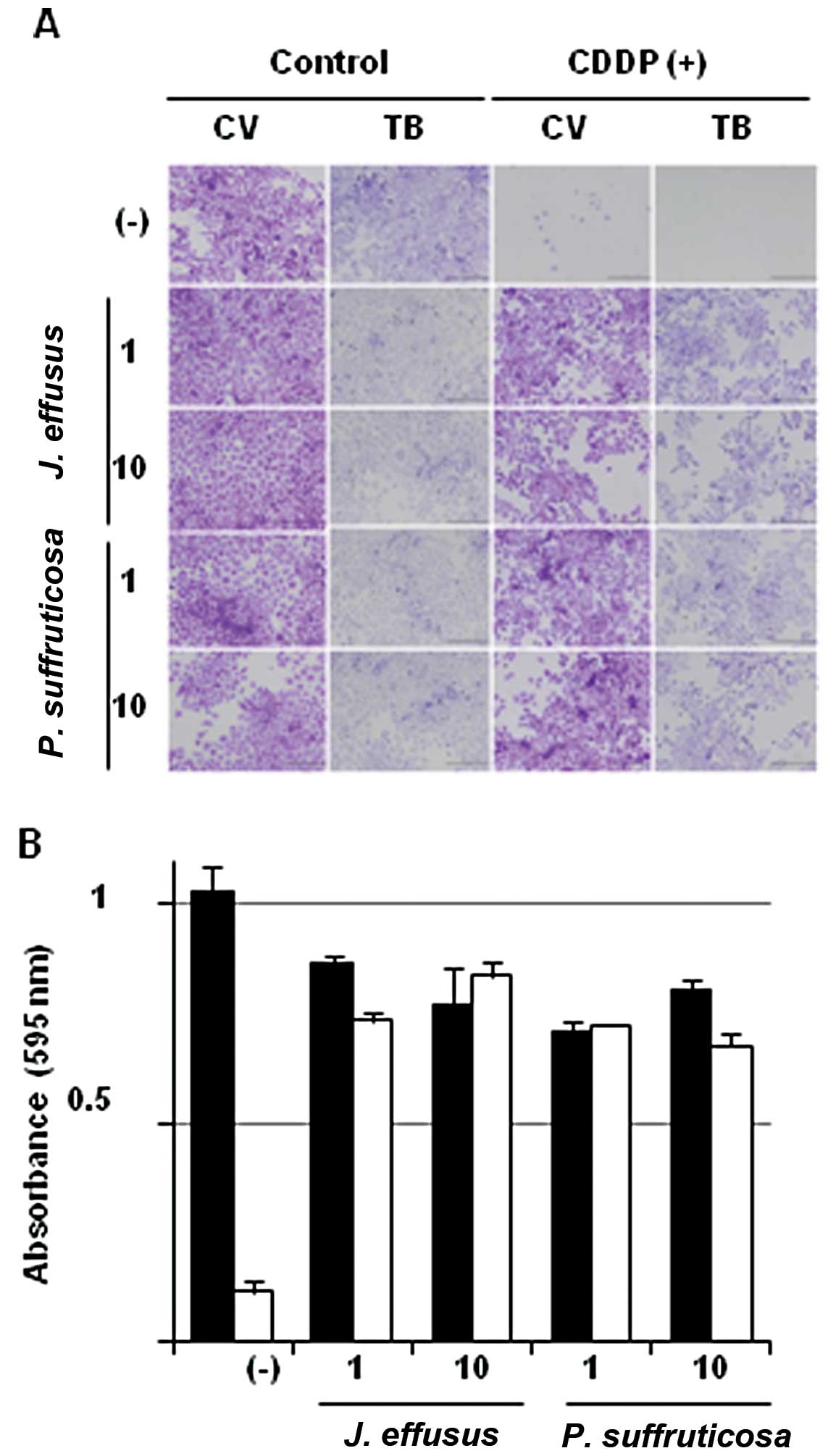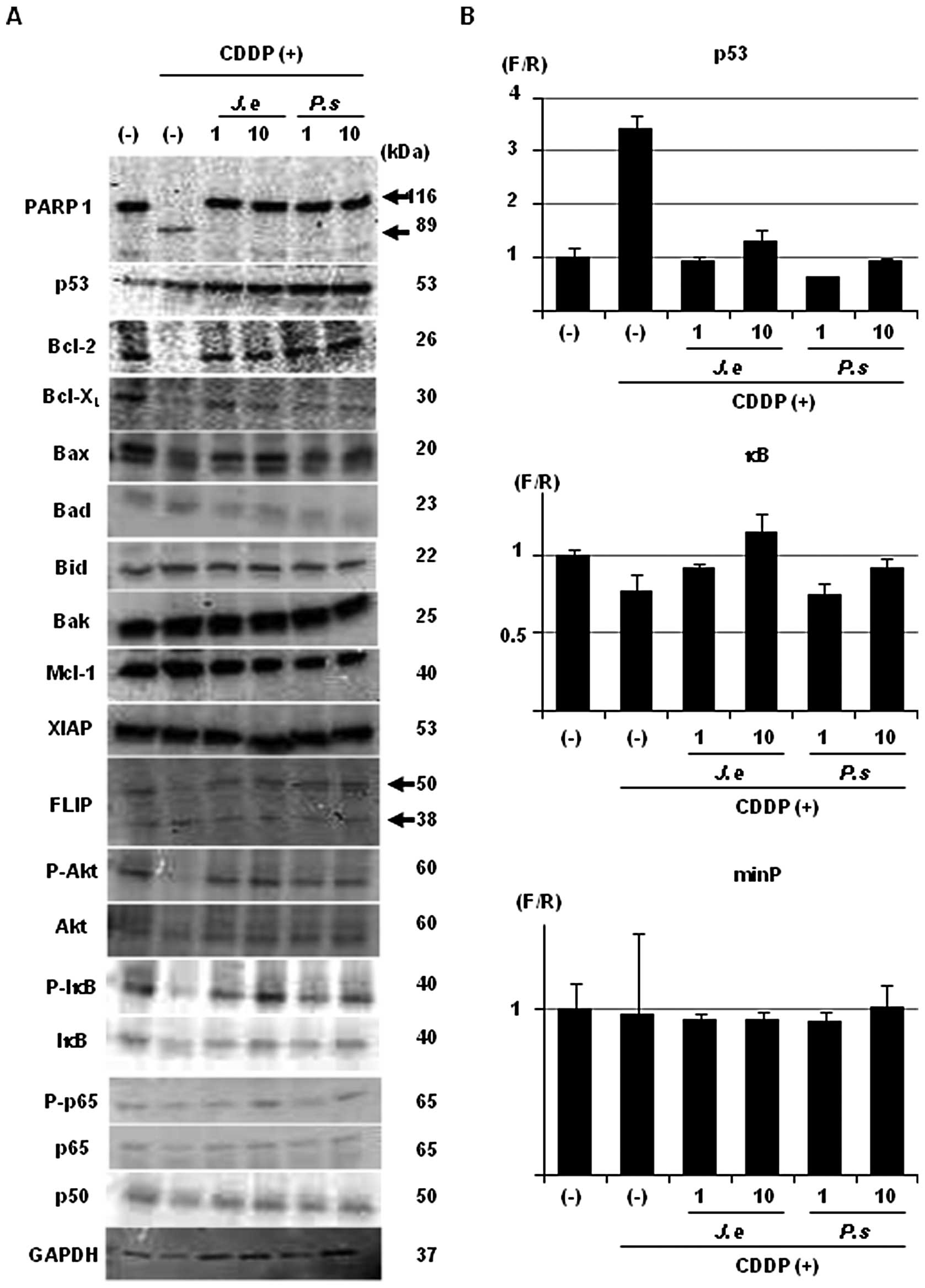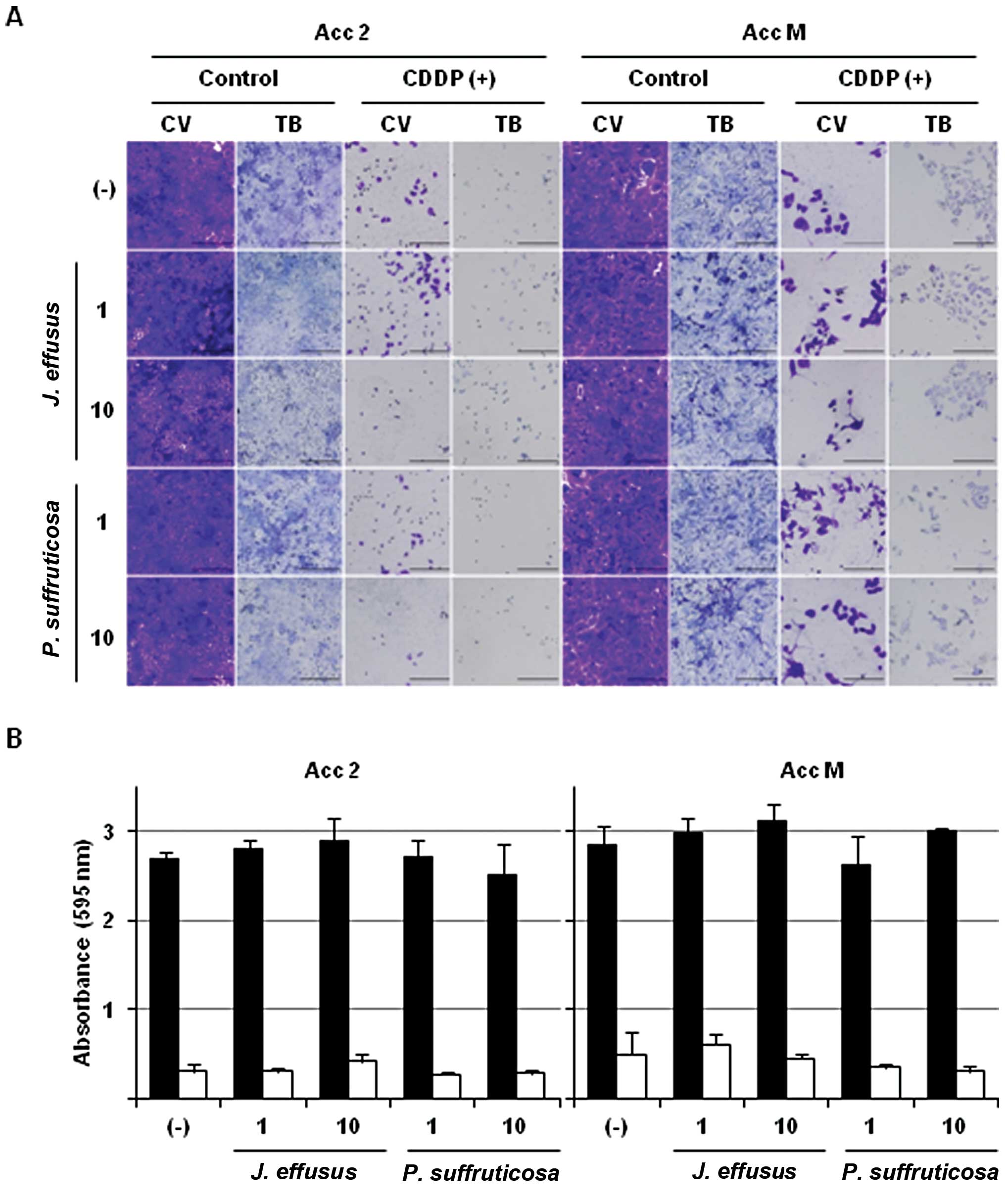|
1
|
Choi S and Myers JN: Molecular
pathogenesis of oral squamous cell carcinoma: implications for
therapy. J Dent Res. 87:14–32. 2008. View Article : Google Scholar : PubMed/NCBI
|
|
2
|
Scully C and Bagan JV: Recent advances in
oral oncology 2008; squamous cell carcinoma imaging, treatment,
prognostication and treatment outcomes. Oral Oncol. 45:e25–e30.
2009. View Article : Google Scholar : PubMed/NCBI
|
|
3
|
Price KA and Cohen EE: Current treatment
options for metastatic head and neck cancer. Curr Treat Options
Oncol. 13:35–46. 2012. View Article : Google Scholar : PubMed/NCBI
|
|
4
|
dos Santos NA, Carvalho Rodrigues MA,
Martins NM and dos Santos AC: Cisplatin-induced nephrotoxicity and
targets of nephroprotection: an update. Arch Toxicol. 86:1233–1250.
2012.PubMed/NCBI
|
|
5
|
McWhinney SR, Goldberg RM and McLeod HL:
Platinum neurotoxicity pharmacogenetics. Mol Cancer Ther. 8:10–16.
2009. View Article : Google Scholar
|
|
6
|
Herrstedt J: Antiemetics: an update and
the MASCC guidelines applied in clinical practice. Nat Clin Pract
Oncol. 5:32–43. 2008. View Article : Google Scholar : PubMed/NCBI
|
|
7
|
Rybak LP, Mukherjea D, Jajoo S and
Ramkumar V: Cisplatin ototoxicity and protection: clinical and
experimental studies. Tohoku J Exp Med. 219:177–186. 2009.
View Article : Google Scholar : PubMed/NCBI
|
|
8
|
Rapidis AD, Trichas M, Stavrinidis E, et
al: Induction chemotherapy followed by concurrent chemoradiation in
advanced squamous cell carcinoma of the head and neck: final
results from a phase II study with docetaxel, cisplatin and
5-fluorouracil with a four-year follow-up. Oral Oncol. 42:675–684.
2006.PubMed/NCBI
|
|
9
|
Psyrri A, Kwong M, DiStasio S, et al:
Cisplatin, fluorouracil, and leucovorin induction chemotherapy
followed by concurrent cisplatin chemoradiotherapy for organ
preservation and cure in patients with advanced head and neck
cancer: long-term follow-up. J Clin Oncol. 22:3061–3069. 2004.
View Article : Google Scholar
|
|
10
|
Jensen SB, Pedersen AM, Vissink A, et al:
A systematic review of salivary gland hypofunction and xerostomia
induced by cancer therapies: prevalence, severity and impact on
quality of life. Support Care Cancer. 18:1039–1060. 2010.
View Article : Google Scholar : PubMed/NCBI
|
|
11
|
Napeñas JJ, Brennan MT and Fox PC:
Diagnosis and treatment of xerostomia (dry mouth). Odontology.
97:76–83. 2009.
|
|
12
|
Li C, Yazawa K, Kondo S, et al: The root
bark of Paeonia moutan is a potential anticancer agent in
human oral squamous cell carcinoma cells. Anticancer Res.
32:2625–2630. 2012.
|
|
13
|
Azuma M, Tamatani T, Kasai Y and Sato M:
Immortalization of normal human salivary gland cells with duct-,
myoepithelial-, acinar-, or squamous phenotype by transfection with
SV40 ori- mutant deoxyribonucleic acid. Lab Invest. 69:24–42.
1993.PubMed/NCBI
|
|
14
|
Klosek SK, Nakashiro K, Hara S, Shintani
S, Hasegawa H and Hamakawa H: CD151 forms a functional complex with
c-Met in human salivary gland cancer cells. Biochem Biophys Res
Commun. 336:408–416. 2005. View Article : Google Scholar : PubMed/NCBI
|
|
15
|
Banka S, Mukudai Y, Yoshihama Y, Shirota
T, Kondo S and Shintani S: A combination of chemical and mechanical
stimuli enhances not only osteo- but also chondro-differentiation
in adipose-derived stem cells. J Oral Biosci. 54:188–195. 2012.
View Article : Google Scholar
|
|
16
|
Tsukamoto H, Kondo S, Mukudai Y, et al:
Evaluation of anticancer activities of benzo[c]phenanthridine
alkaloid sanguinarine in oral squamous cell carcinoma cell line.
Anticancer Res. 31:2841–2846. 2011.
|
|
17
|
Yasuda A, Kondo S, Nagumo T, et al:
Anti-tumor activity of dehydroxymethylepoxyquinomicin against human
oral squamous cell carcinoma cell lines in vitro and in vivo. Oral
Oncol. 47:334–339. 2011. View Article : Google Scholar : PubMed/NCBI
|
|
18
|
Mukudai Y, Kubota S, Eguchi T, Kondo S,
Nakao K and Takigawa M: Regulation of chicken ccn2 gene by
interaction between RNA cis-element and putative
trans-factor during differentiation of chondrocytes. J Biol
Chem. 280:3166–3177. 2005.PubMed/NCBI
|
|
19
|
Murakami M, Wei MX, Ding W and Zhang QD:
Effects of Chinese herbs on salivary fluid secretion by isolated
and perfused rat submandibular glands. World J Gastroenterol.
15:3908–3915. 2009. View Article : Google Scholar : PubMed/NCBI
|
|
20
|
Yamamoto T, Staples J, Wataha J, et al:
Protective effects of EGCG on salivary gland cells treated with
γ-radiation or cis-platinum(II)diammine dichloride.
Anticancer Res. 24:3065–3073. 2004.
|
|
21
|
Hanawa F, Okamoto M and Towers GH:
Antimicrobial DNA-binding photosensitizers from the common rush,
Juncus effusus. Photochem Photobiol. 76:51–56. 2002.
View Article : Google Scholar : PubMed/NCBI
|
|
22
|
Behery FA, Naeem ZE, Maatooq GT, et al:
Phenanthrenoids from Juncus acutus L., new natural
lipopolysaccharide-inducible nitric oxide synthase inhibitors. Chem
Pharm Bull. 55:1264–1266. 2007.PubMed/NCBI
|
|
23
|
Hong MH, Kim JH, Na SH, et al: Inhibitory
effects of Paeonia suffruticosa on allergic reactions by
inhibiting the NF-kappaB/I kappaB-alpha signaling pathway and
phosphorylation of ERK in an animal model and human mast cells.
Biosci Biotechnol Biochem. 74:1152–1156. 2010.
|
|
24
|
Poon TY, Ong KL and Cheung BM: Review of
the effects of the traditional Chinese medicine Rehmannia Six
Formula on diabetes mellitus and its complications. J Diabetes.
3:184–200. 2011. View Article : Google Scholar : PubMed/NCBI
|
|
25
|
Choi HS, Seo HS, Kim JH, Um JY, Shin YC
and Ko SG: Ethanol extract of Paeonia suffruticosa Andrews
(PSE) induced AGS human gastric cancer cell apoptosis via
fas-dependent apoptosis and MDM2-p53 pathways. J Biomed Sci.
19:822012.
|
|
26
|
Meulmeester E and Jochemsen AG: p53: a
guide to apoptosis. Curr Cancer Drug Targets. 8:87–97. 2008.
View Article : Google Scholar
|
|
27
|
Manning BD and Cantley LC: AKT/PKB
signaling: navigating downstream. Cell. 129:1261–1274. 2007.
View Article : Google Scholar : PubMed/NCBI
|
|
28
|
Brenner D and Mak TW: Mitochondrial cell
death effectors. Curr Opin Cell Biol. 21:871–877. 2009. View Article : Google Scholar
|
|
29
|
Hayden MS and Ghosh S: Shared principles
in NF-κB signaling. Cell. 132:344–362. 2008.
|
|
30
|
Azuma M, Tamatani T, Ashida Y, Takashima
R, Harada K and Sato M: Cisplatin induces apoptosis in oral
squamous carcinoma cells by the mitochondria-mediated but not the
NF-κB-suppressed pathway. Oral Oncol. 39:282–289. 2003.PubMed/NCBI
|


















